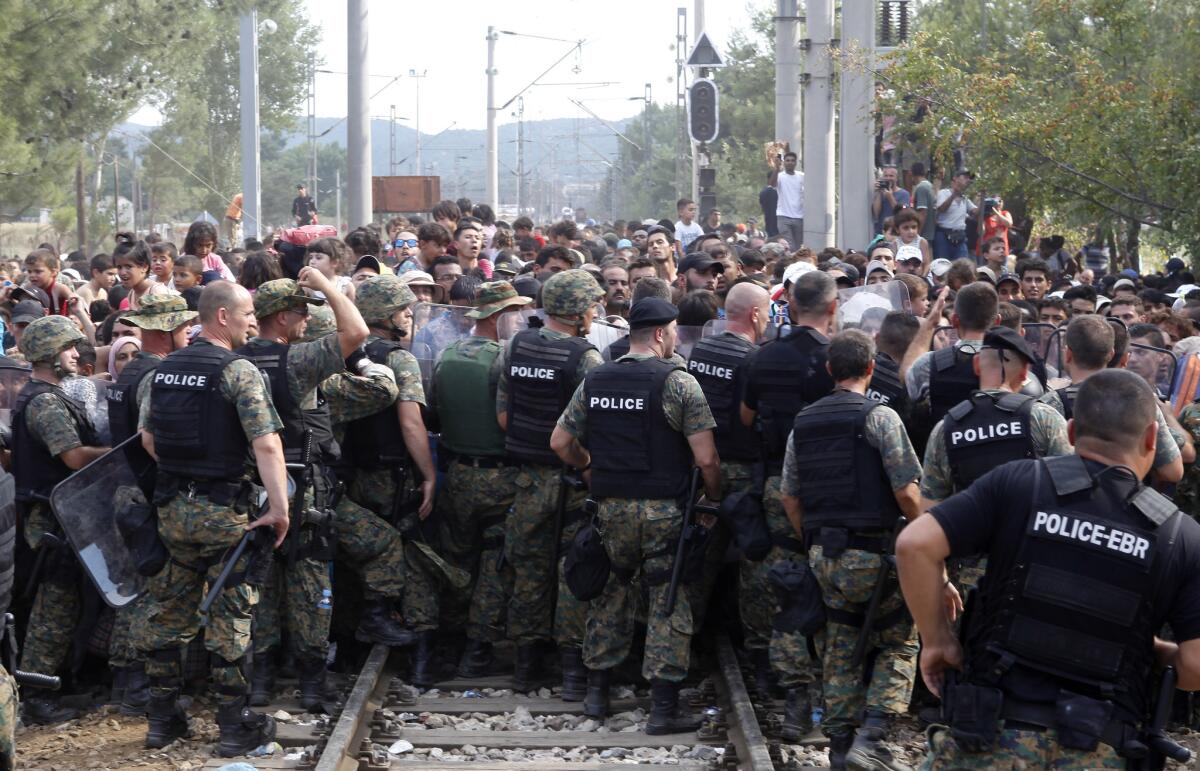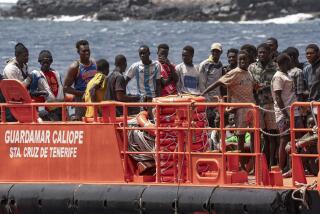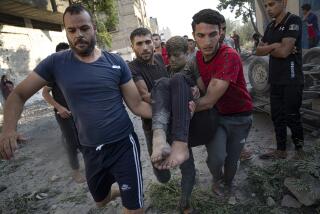Police battle migrants on Macedonia’s border with Greece

Macedonian police officers block migrants from entering Macedonia illegally from Greece at the railway tracks on the border near Gevgelija on Aug. 21.
- Share via
Reporting from Idomeni, Greece — Macedonian police used stun grenades and truncheons Friday to push back refugees and migrants trying to enter the country on their way to northern Europe, stanching a flow of people that had reached about 2,000 a day and leaving thousands of desperate people stranded on the Greek side of the border.
The Macedonian government declared a state of emergency Thursday in the southern and northern border areas where refugees and migrants have been entering and leaving the country, and police began trying to limit the flow of people from Greece.
By Friday afternoon, police had allowed about 300 people to cross the border, and an officer told the crowd authorities would continue to allow small groups through at intervals. But with at least 3,000 people at the border and more arriving every hour, refugees were desperate to cross and the crowd was tense.
A throng of people pressed against the police line and the razor wire strung along the border, many holding crying children on their shoulders and begging to be allowed to pass. Women screamed, and men shouted that they were being suffocated in the crush. When some surged forward, officers beat them with truncheons.
NEWSLETTER: Get the day’s top headlines from Times Editor Davan Maharaj >>
At least 10 people were injured in clashes Friday morning.
The thousands on the border are part of a massive wave of refugees and migrants heading to Europe, many fleeing conflicts in the Middle East and Afghanistan. The route from Turkey to Greece, and then north through Macedonia, Serbia, and Hungary, has become arguably the most traveled route. Most refugees are heading for countries with strong economies, such as Germany and Sweden.
In recent weeks the number of people traveling this route has surged. More than 160,000 refugees and migrants have arrived in Greece so far this year, according to the United Nations refugee agency, with more than 50,000 arriving last month alone. Most of them continue north, and the tiny southern border town of Gevgelija in Macedonia has become overwhelmed with refugees who wait to be registered by the police and then wait to board trains for Serbia and beyond.
Police in Macedonia registered more than 41,500 refugees since they began June 19. However, the real number traversing the country is higher, as some people cross without waiting to be registered.
Mohamed Khalil, 26, and his wife, Sahar Mohamed, 18, on Friday had been waiting at the border for three days under the hot sun, in a rubbish-strewn patch of dust. Sahar Mohamed splashed water on the head of her 2-year-old daughter, Yara, to keep her cool. They fled the war in Syria, hoping to find a better life in Germany, but they hadn’t expected to endure conditions like those they are experiencing now.
“It’s very bad here,” said Khalil. “There’s no shade for the children, and there’s some water but very little food. We haven’t been eating – we’ve been giving all our food to the children.”
The couple is traveling with a family group that includes five children. At night, the children sleep in a tent while the adults sleep on the open ground.
“I don’t know what we’ll do,” said Khalil. “We’re waiting for God to open the way to Germany.” Doctors Without Borders, the private charity, has a team at the border providing medical consultations and distributing water, food and hygiene items. It also set up chemical toilets, showers and taps of drinkable water, but the facilities are not sufficient for the large crowd.
Antonis Rigas, head of the local team, said there were many vulnerable people among the crowd at the border, including sick children and adults with conditions such as diabetes.
A spokesman for Macedonia’s Interior Ministry said authorities declared the state of emergency in reaction to complaints by the citizens of Gevgelija about the high number of migrants in their city, and that they were attempting to limit the flow of refugees to avoid the large crowds that had been sleeping on the ground at the train station.
“We can help in a better manner, a more humane manner, if 100 are entering per day, instead of 1,000 or 10,000,” said the spokesman, Ivo Kotevski.
He blamed Greece, which has been burdened by its own deep economic crisis, for not stopping the flow of people and said European Union countries were urging Macedonia to do so.
“So we are facing pressure from the EU border from the south, and facing also pressure from the EU to tackle this issue and not to let these immigrants travel to richer EU countries.”
Chick is a special correspondent.
MORE WORLD NEWS:
Gunman on train subdued by two Americans, French official says
North Korea’s Kim Jong Un places nation’s border in ‘semi state of war’
Nelson Mandela’s grandson in court on rape charges
More to Read
Sign up for Essential California
The most important California stories and recommendations in your inbox every morning.
You may occasionally receive promotional content from the Los Angeles Times.










